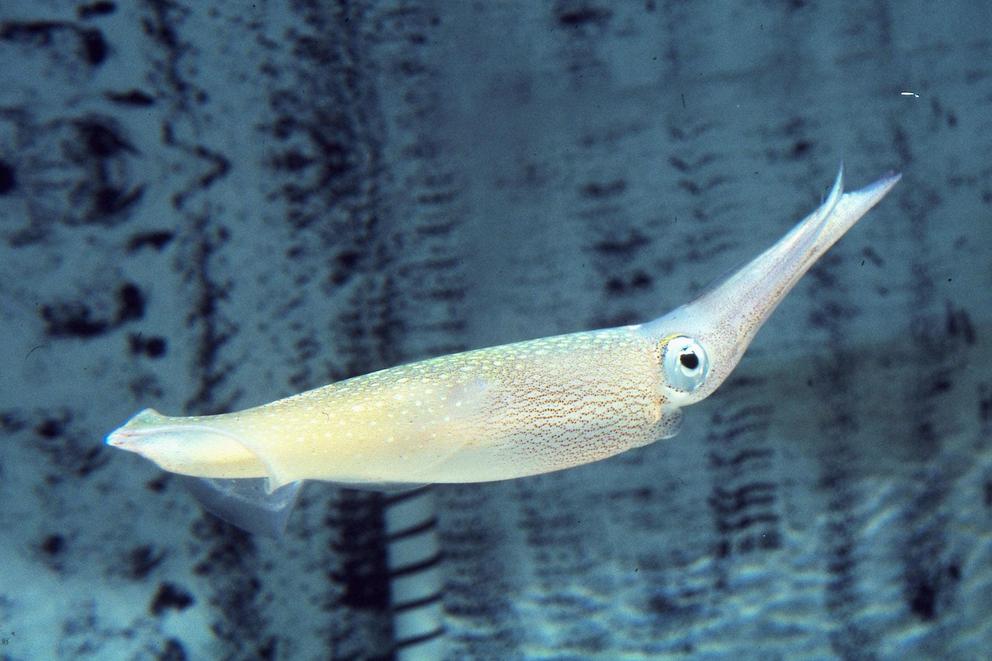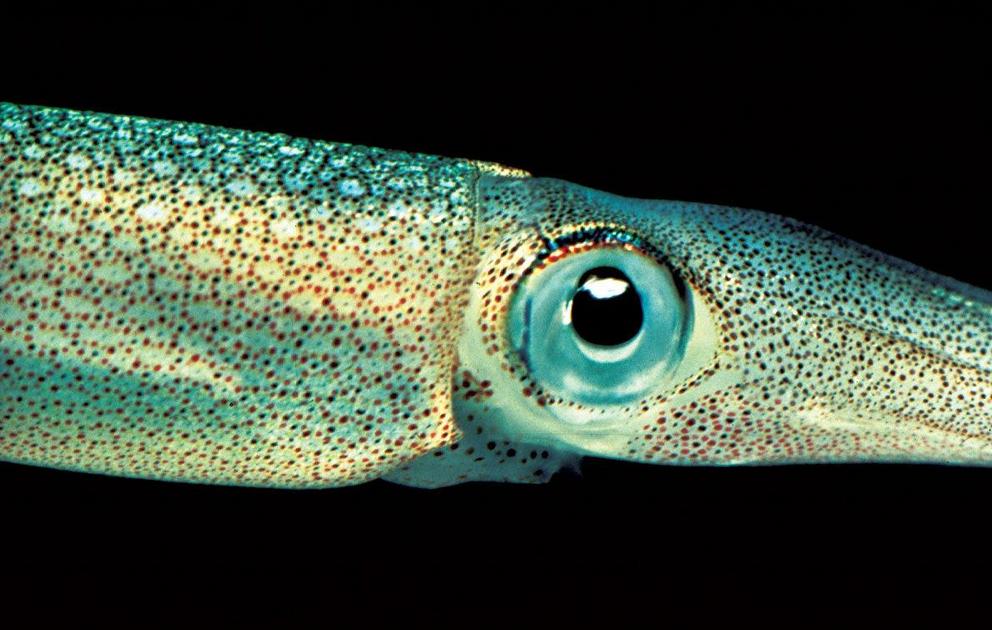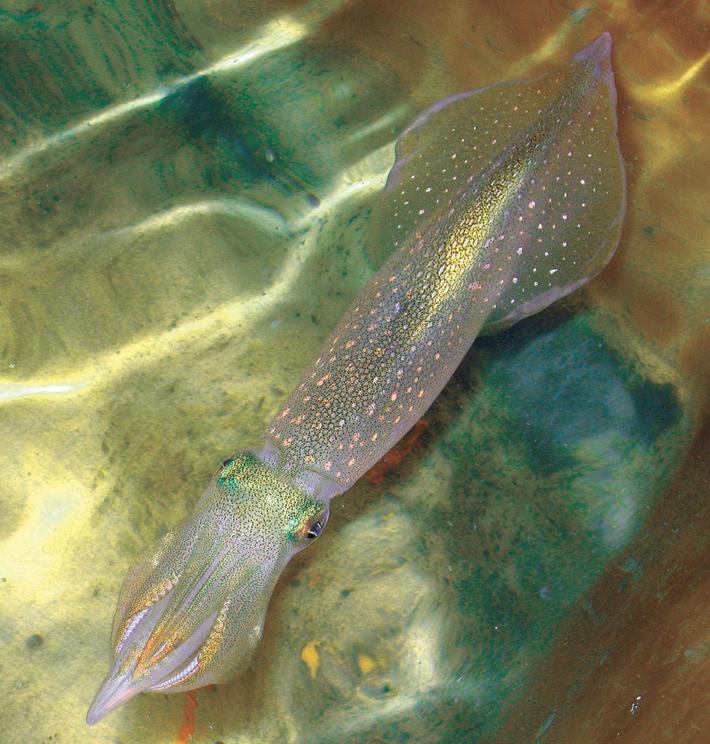Squids' gene-editing superpowers may unlock human cures
Researchers found that the cephalopod is the only creature that can edit its RNA outside the nucleus. It's a tool that may one day help genetic medicine.

The squid does its RNA editing on a massive scale. More than 60,000 brain cells undertake this re-coding process in squid, as compared to a few hundred sites in humans.Photograph: Roger Hanlon/The Marine Biological Laboratory
Gene-editing techniques like Crispr-based technologies aim to cure human disease by altering the genetic code of our DNA. For nearly every animal on Earth, any changes made to the DNA are transmitted from the cell nucleus by messenger RNA to the cytoplasm, the part of the cell that makes proteins.
But one animal species—a squid used as bait by fishermen, and as food by bigger sea creatures—has already figured out how to edit its genetic code in a way that may help scientists working on gene editing-based drugs and treatments. Scientists at the Marine Biological Laboratory in Woods Hole, Massachusetts, and their colleagues reported on Monday in the journal Nucleic Acids Research that longfin inshore squid (Doryteuthis pealeii) are the first known animals that can edit messenger RNA outside the cell nucleus.
MBL senior scientist Joshua Rosenthal, an author on the new paper, says this unusual method of editing messenger RNA likely has something to do with the squid’s behavior in the ocean. “It works by this massive tweaking of its nervous system,” Rosenthal adds. “Which is a really novel way of going through life.”
All organisms do some form of RNA editing. In humans, some disorders have been linked to malfunctions of RNA editing, such as the sporadic form of amyotrophic lateral sclerosis, better known as ALS or Lou Gehrig's Disease. RNA editing also plays a role in immunity, and some studies in fruit flies show that it may help them adapt to changing temperatures.
But the squid does this RNA editing on a massive scale. More than 60,000 brain cells undertake this recoding process in squid, as compared with a few hundred sites in humans. Rosenthal and colleagues from Tel Aviv University and the University of Colorado at Denver found that RNA editing takes place in the squid’s axon, the stretched-out region of the brain cell that transmits electrical signals to nearby neurons. This is an important finding because squid nerve cells are immense, with axons sometimes stretching several feet long. By editing their RNA outside the nucleus, the squid can potentially change protein function much closer to the part of the body that needs an adaptation.
For Rosenthal, now that his team knows that the squid has the cellular machinery to do this RNA editing, the next task is to understand why. He suspects it has something to do with allowing the squid to better adapt to changing environmental conditions such as water temperature. “We want to look at its behavior if I manipulate the RNA editing,” he says.

Photograph: Roger Hanlon/The Marine Biological Laboratory
The fact that the squid does this editing with messenger RNA, rather than DNA, intrigues some researchers who are interested in human gene editing. Coding changes made to DNA—the kind medical researchers are working on with Crispr—are irreversible. But since unused messenger RNA degrades quickly, any errors introduced by a therapy would be washed out, rather than staying with a person forever.
Rosenthal believes that this ability to change faulty information in the cell without making permanent changes to the DNA in the nucleus might be a huge benefit for medical researchers. “If you have some faulty information inside of your genome—say, you inherited a nucleotide base from your parents, and normally it’s a ‘G’ and it’s an ‘A’ in you—then you could potentially change it back by editing the RNA,” he says, referring to the shorthand for guanine and adenine, two of the building blocks that make up RNA.
“RNA editing is a hell of a lot safer than DNA editing. If you make a mistake, the RNA just turns over and goes away,” he Rosenthal.
“It’s an exciting paper,” says Heather Hundley, associate professor of biochemistry and molecular biology at Indiana University, who was not involved in this study. “Most of what we know of editing is occurring in the nucleus of the cell, which is fine for normal processes. But in thinking about personalized medicine and therapeutics, in order to change patients’ mutations, we will have to do it in the cytoplasm.”
Therapies using RNA editing to alter messenger RNA would only need to enter the cell and function in the cytoplasm to be effective, whereas genome editing therapies meant to alter the DNA need to cross both the cell and the nuclear membrane. The RNA editing in the squid axon demonstrated in Rosenthal’s paper is analogous to the RNA editing that would need to occur in the cytoplasm for human therapies.

Photograph: Elaine Bearer
Hundley believes an enzyme the squid uses to edit its RNA could potentially be used in humans to make changes in human messenger RNA. “Many people are trying to do this, but the question is: What enzyme is the therapeutic?” Hundley asks. “If the squid enzyme can work in the cytoplasm, it would be high on the list for being used as a therapy.”
Beyond the squid lab at Woods Hole, RNA editing has become a fast-moving field of research. In 2018, the Food and Drug Administration approved the first therapy using RNA interference, a technique in which a small piece of RNA is inserted into a cell, binding to its native messenger RNA and hastening their degradation. The therapy disrupts a protein that causes nerve damage in patients with a rare genetic disorder called hereditary transthyretin amyloidosis, a condition that ultimately leads to organ failure and death.
In 2019, researchers published more than 400 papers on the topic, while several biotech startup companies—including one cofounded by Rosenthal—are beginning to use RNA-editing systems to develop potential treatments for genetic diseases such as muscular dystrophy and remedies for acute pain that don’t involve addictive opiates.
Rosenthal says the squid is a remarkable creature and likely will reveal many more biological secrets—some of which may eventually help those who consider it just an appetizer.
